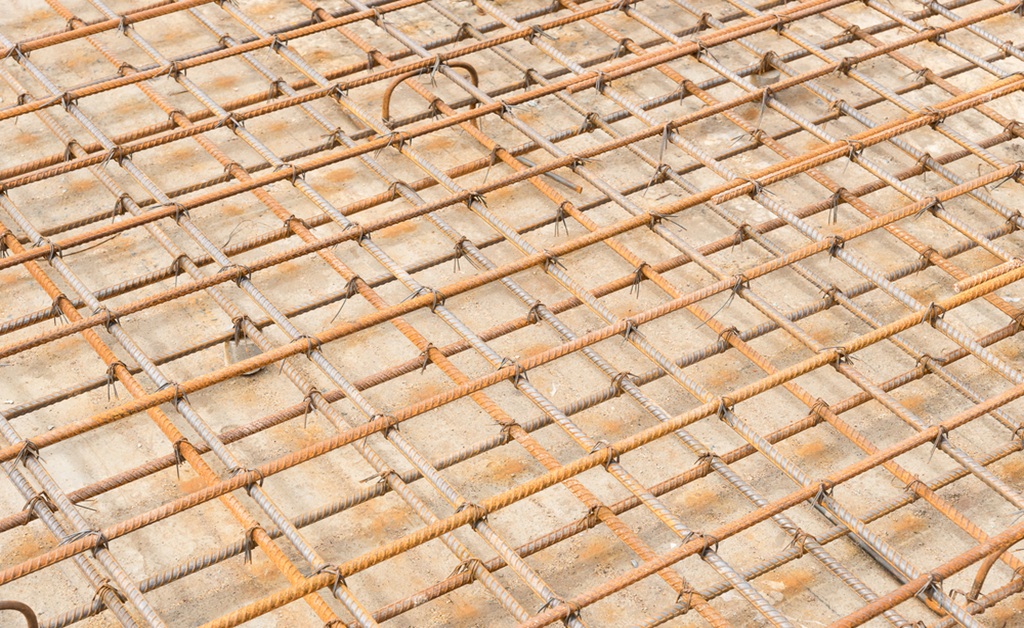If you’re set to undertake a concrete work, you have most likely come across the word “rebar” when talking about this project to contractors or when researching construction guides. But what is rebar, and why is it so important to a concrete work? Knowing this important construction material will allow you to make better decisions about your project and keep it standing even in subsequent years. Even if you’re seeking residential concrete services in OKC from Bill’s Custom Concrete, it’s still worth being in the know.
Rebar is a short form of ‘reinforcing bar’ that is a mesh or a steel rod located within concrete to strengthen it. While concrete can resist compression force effectively, it is rather poor when it is stretched or pulled. Rebar makes up for this deficiency by providing tensile strength to create a composite material that resists compression as well as a force of tension effectively.
Material of Rebar and Types of Coating
Not all rebar is of equal quality. While most standard rebar is made of carbon steel and provides optimal strength as a lower price, some work will necessitate special types.
Stainless steel rebar is more expensive but has better corrosion resistance and is best used in marine environments or extreme weather applications. For applications where a rebar product must be non-magnetic, such as near an MRI machine, a product like fiberglass rebar is a viable solution.
The coatings also have a crucial contribution to make in rebar performance. An epoxy-coated rebar has a coating that inhibits rust and corrosion and helps to prolong your concrete structure’s life. Another corrosion-inhibiting rebar is found in galvanized rebar, although it is usually costlier than plain carbon steel.
Advantages of Adding Rebar to Concrete
The real benefit of rebar is that it stops concrete from cracking and breaking up. When concrete is cracking under pressure, rebar allows that pressure to spread to a larger area so that small cracks do not escalate into a structural failure.
What size rebar is used in residential concrete? It depends on the project type, but choosing appropriate sizes helps extend the lifespan of your concrete structures. Concrete without rebar will develop hairline cracks that let in moisture, and freeze-thaw damage will further deteriorate it. Rebar reinforcement allows structures to keep their integrity when settling or temperature fluctuations happen.
Temperature changes make the concrete expand and contract and could result in stress cracks. Rebar allows this expansion to happen while keeping the structure strong overall, so your investment will be solid through the decades.
Necessary Applications of Rebar
Foundation work is one of the most significant applications of rebar. While building a house, garage, or even an entrepreneurial venture, reinforced concrete foundations allow you to have a solid base to support all of it. The rebar redistributes weight evenly and does not permit settlement cracks.
What size rebar for a concrete slab? If you’re trying to determine the right rebar size for slab, consulting with Bill’s Custom Concrete on the structural requirements ensures you get the durability you need for the specific load and usage.
Sidewalks and driveways also require rebar reinforcement to a large extent, particularly if these have to bear heavy traffic or difficult soil. Freeze-thaw cracking and heavy loads are prevented by the steel reinforcement.
Retaining walls require rebar to handle the immense pressure from soil and water behind them. Without proper reinforcement, these structures can fail catastrophically, potentially causing property damage and safety hazards.
Whether installing a walkway or using rebar for a concrete patio, rebar makes sure your surfaces resist cracking and wear, especially with heavy use and changing weather conditions.
Making the Right Choice About Your Project
Understanding rebar’s role in concrete construction empowers you to have meaningful discussions with contractors and make decisions that protect your investment. While adding rebar increases upfront costs, it provides tremendous value through improved durability and reduced maintenance needs over time.
Whether it is a small patio or an elaborate basement, talking to our team at Bill’s about rebar options is a surefire way to make your concrete project last a lifetime. Proper reinforcement now wards off costly repair and replacement in the future.

